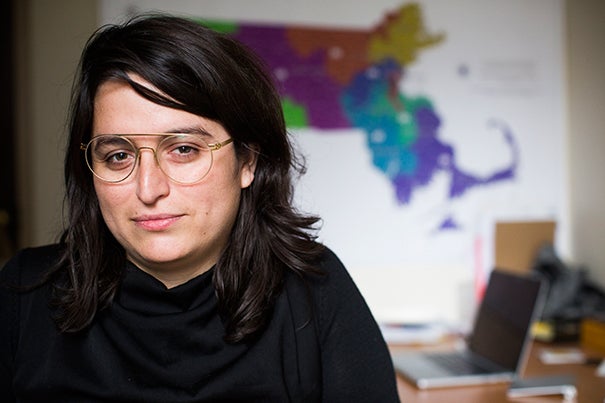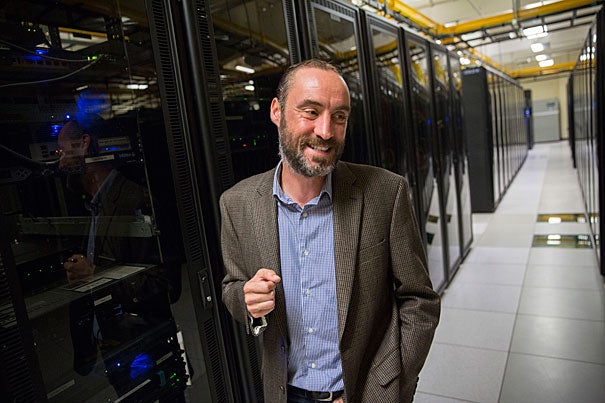
Paola Villarreal, a fellow at the Berkman Klein Center, is using data visualization to shed light on inequality in health, housing, and more.
Stephanie Mitchell/Harvard Staff Photographer
Sifting data, seeking justice
Berkman Fellow aims for detailed picture of inequality
More like this
Growing up in Mexico City as a self-proclaimed geek, Paola Villarreal first realized the power of data after she arrived at a public bike-share station and discovered that all the bikes were taken.
Villarreal, then 26 and a self-taught computer programmer, used information the bike-share program had posted online, albeit in an obscure format, to develop a mobile application. The app allowed her to check her phone for sites on the program’s citywide network that had bikes available. She shared the app with her friends, and before long it became so popular city officials sought to buy it, paying Villarreal six digits.
With 17 years of experience as a programmer and software developer under her belt, Villarreal credits open source, in which software’s source code is free and available to all, as the main factor that led her to become a data scientist.
“Open source changed my life,” she said. “I learned coding and everything I know about computers and programs through open source.”
Villarreal, now 32 and a fellow with the Berkman Klein Center for Internet & Society, continues to advocate for open source, but has made room for a new crusade: free access to public information. With open source, citizens can view, modify, and share source code. But they should also have access to data produced by the government, she says.
Villarreal speaks from experience. During her 2004-2005 tenure as systems administrator for Mexico’s Presidency internet office, she focused on making sure servers could handle up to 20,000 simultaneous users. Working for the government helped put her on the side of wider transparency.
“If the government produces information that has an impact on people’s lives, it should make it available and shouldn’t make it hard to get,” she said. “People should have access to information and data.”
At the Berkman Klein Center, Villarreal has been using open source and developing data tools, including interactive maps, to explore inequality in Boston-area justice, health, education, housing, and transportation. She began the work in September 2015 as a Ford-Mozilla Open Web Fellow with the American Civil Liberties Union of Massachusetts. At the Berkman Klein Center, she is focusing on the Data for Justice Project, which investigates stop-and-frisk practices and drug arrests by Boston police.
The project features an interactive map that compares police action in white and minority neighborhoods. To build the map, Villarreal analyzed “gigabytes of data” and programmed massive amounts of code, which resulted in a data-visualization framework that might eventually be used in other cities, she said.
Though the map doesn’t tell a complete story, it’s a valuable tool for social justice advocates, said Kade Crockford, director of the Technology for Liberty Program at the ACLU of Massachusetts.
“Asking these questions helps us get a little bit further in the conversation we’re having as a nation,” said Crockford. “We hope that community organizers, activists, and politicians will look at these data and hopefully start asking more difficult questions. One of them should be, do you really think white people don’t use or sell drugs? So why aren’t they being arrested? Those are questions nobody is asking right now.”
Villarreal’s work with the ACLU drew the attention of the Berkman Klein Center because of its use of novel data tools to investigate racial and social inequalities, said Rebecca Tabasky, manager of community programs at the center.
“We’re deeply interested in exploring issues of social justice,” said Tabasky. “Paola’s work falls in alignment with some of the things we’re exploring — looking at data, data visualization, open technology, and civic engagement, and the way in which all of these things intersect with communities.”
As for Villarreal, the project is another bid to improve people’s daily lives, just as she did back home by connecting riders with bikes.
“The idea is to make the information accessible to the general public to identify needs,” she said. “I believe in the power of data to help spread equality and social justice.”





